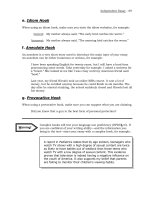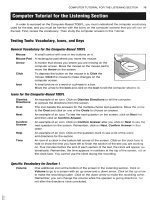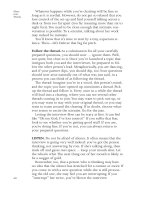Express yourself part 9 pptx
Bạn đang xem bản rút gọn của tài liệu. Xem và tải ngay bản đầy đủ của tài liệu tại đây (94.37 KB, 10 trang )
Do you see how the language from the catalog has helped you bridge the connection between yourself
and the school? Of course, you have to go on to develop this connection with specific examples. You will also
want to construct other bridges between yourself and the school as you go along and the more specific infor-
mation that you have the better. However, the introduction to this brief essay has set the path for you. You
could go on as follows:
I have read the catalog carefully and believe that the opportunities for study abroad, public ser-
vice internships, and the college’s emphasis on environmental issues will help me to develop my per-
sonal goals and interests. I have been active as a volunteer for our local homeless shelter, and I worked
each year in high school on our school’s Earth Day projects. Last year I was Chairman of Earth Day
2001, and we worked to bring attention to the increasing air pollution in our national parks. Maryville
is very close to the Great Smoky Mountain National Park, and its Mountain Challenge program is
very interesting to me. I believe that I can contribute enthusiasm, energy, and commitment to
Maryville.
If one paragraph is all you have space for, and it often is, then the paragraph above demonstrates how
to say a lot in a little space. Notice something very important. This student has carefully examined the col-
lege catalog and really knows why Maryville is a good choice. No college recruiter wants to think that you
know little or nothing about the school. They are looking for a four-year commitment, and the more you
know about them, the more likely that you’ll make a contribution to the school and complete your four years.
To summarize:
➡ Know the school well. Include specifics about the school’s philosophy or its programs to anchor
your interest to the school itself.
➡ Offer specific examples about yourself to demonstrate that you have experiences in which the
school will be interested. Remember, you want them, but they have to know there’s something you
have that they want.
➡ Watch your grammar and mechanics. This is another place where you don’t want to be dismissed
because you don’t know “there” from “their.”
Now it’s time to look at narrative writing and the college essay.
PERSUASION IN EVERYDAY WRITING EXPRESS YOURSELF
69SECTION
WRITING
TO
NARRATE
NARRATIVE WRITING is telling a story in order
to establish an idea or assert an opinion. It fol-
lows all the conventions of good storytelling
such as characterization, plot, and theme, and
it is often used as a means to get you to write
about yourself. Narrative writing is sometimes
called reflective writing.
arrative writing is often thought of as creative writing because it is assumed that
if you are going to write a story it is going to be just like a story written by an
established author. But this is not always the case. As a matter of fact, narration is fre-
quently used to add interest or emphasis to informational or persuasive writing.
THREE
THREE
N
N
Remember the anecdote or personal story used to begin a powerful persuasive essay or speech? That is also
a form of narrative writing.
For our purposes in this section we will look at three ways that narrative writing can be used.
➡ narratives of personal experience
➡ narratives for academic purposes
➡ narratives in everyday life
In the first chapter, we will explore the various ways that you are asked to use your personal experiences
to write about yourself. From the “getting to know you” essay that you are asked to write on the first day of
every English class to that college application essay, personal narratives are an integral part of your school
writing experiences.
In the second chapter, we will look at ways that a good story can enrich and invigorate even your most
basic content-area reading and writing. From science to social studies, putting factual information into story
form can be a very powerful study tool.
In the third chapter, we will look at narratives in everyday writing such as journals, diaries, letters, and
even e-mails.
But before we begin, we must look at the general characteristics of narrative writing which include:
➡ characterization
➡ plot
➡ setting
➡ theme
All good stories have lively, memorable characters. By creating such characters, the writer invites the
reader to participate in the experiences of the character(s).
The experiences are the plot, which is the sequence of events that the characters go through in order to
establish the meaning or significance of the events.
The significance of the events—what they mean, and what the characters have learned from them—is
called the theme.
Where all this occurs—the place, the time, the weather—is called the setting.
Read the following narrative of personal experience, written by a high school senior reflecting on a very
important turning point in his life. See if you can identify the characters, the plot, the setting, and the theme,
as well as the literary elements that contribute to good storytelling—figurative language (similes and meta-
phors), foreshadowing, irony, allusion, and even symbolism.
HEARTBREAK
Heartbreak. One of the most important lessons that I will have learned in high school is heart-
break. Despite all the teachers impressing upon me lesson after lesson of how to write, how to solve
equations, and even how to speak another language, I will always remember my lesson in heartbreak.
At Farragut High School, the privilege of attending Prom remains the highlight of most stu-
dents’ junior year. After two years of hard work, students graduate to the status of an upperclass-
EXPRESS YOURSELF WRITING TO NARRATE
72
man. Consequently, they receive the right to attend Prom, of course after paying a nominal fee,
as nothing in life comes free of charge. To this end, I encountered heartbreak with no exception,
as it proved costly both physically and emotionally.
Sunday, two months before prom, I finally mustered up the courage to ask a girl, whom we
shall call H.B., short for heartbreak. In asking her, I followed the philosophy, “If you are going to
go, go all out!” The look of shock on H.B.’s face when I appeared at her door that fateful Sunday
afternoon reassured me that I had broken all expectations of how a guy should ask a girl to the
Prom in an original manner. I felt I had nothing to worry about when H.B. said she needed to
think about her answer. Girls always took time to answer. Didn’t they? Such is the way of life. As
I rode home, I imagined ways that H.B. would answer my question, always expecting the answer
to be, “Yes.”
Later that night, after eating dinner, the telephone rang. As my mother shouted up the stairs
that H.B. was calling, my heart jumped.
I recalled all the effort that led up to asking H.B. to the Prom. I mused over the various dates
bowling with friends, the Winter Dance, and the movies. I called to mind the occasions in which
I bought roses for no reason in particular. I thought back to the occasions in which I emptied my
wallet to brighten her day. I recollected coloring the words “H.B. will you go to the prom with
me” on the six-foot-long by five-foot-high banner. I remembered attaching all twenty-four red
and white helium filled balloons. I reminisced in the memory of attempting to fit the “float” into
my mom’s van and then attempting to walk inconspicuously to H.B.’s front door. I saw again the
look on her face as she opened her door. However, this time her face appeared not happily sur-
prised but painfully shocked.
At that moment, everything, all my efforts, all my emotions, all my expectations that lay bal-
anced on the scale of life suddenly became weightless in comparison to the heavy words that landed
on the other end of the scale. “I am already going to the Prom with someone else.”
My heart came crashing to earth like Wile E. Coyote after another failed attempt at catching
the roadrunner. Indeed, the Acme fabric wings disintegrated, the Acme helicopter fell apart, the
Acme jet-powered skates ran out of fuel, unraveled and snapped all at the same time. Acme must
have also made my Prom expectations because at that moment, they too disintegrated, fell apart,
ran out of fuel, unraveled and snapped altogether. I expected a wonderful evening with a girl for
whom I cared. I expected to continue building a relationship with H.B. I expected that my expec-
tations would transform into reality. Most important of all, I expected her to say, “Yes.”
In short, I realized none of my Prom expectations. My relationship with H.B. also ended
abruptly. A simple, “Yes”became an even simpler, “No.” My Prom plans and my relationship plans
became simpler still. H.B. had picked me to the bones like desert buzzards with a newfound car-
cass and it will take a long time for it all to heal. Heartbreak.
1. Can you identify the theme? What is the author telling us about heartbreak?
2. Are the characters memorable? Do you have an image of the author and H.B.?
3. Is the plot clear? Do you notice how the story unfolds with a distinct beginning (pre-Prom), middle
(asking and then waiting for an answer), and end (heartbreak)?
4. How about the setting? Can you picture the “float”? H.B.’s front door?
WRITING TO NARRATE EXPRESS YOURSELF
73
5. Did you recognize any literary devices? The reference to Wile E. Coyote is called “allusion.” Being
picked to the bones “like desert buzzards” is a simile. “My heart came crashing to the earth” is per-
sonification. “That fateful Sunday” is foreshadowing. And there were two other instances of fore-
shadowing. Can you find them?
6. How about the excellent visual details (imagery) used to describe the “float”?
All in all, this was a very successful narrative of personal experience. Now let’s see how all of this can
be applied to other narrative situations.
EXPRESS YOURSELF WRITING TO NARRATE
74
CHAPTER
NARRATIVES OF
PERSONAL
E
XPERIENCE
THE NARRATIVE of personal experience allows
you to communicate to your reader the people,
places, and events in your life that have been of
significant influence. What you choose to write
about and how you present the information and
emotions indicate a great deal about your values
and attitudes.
oesn’t it seem that every time you walk into an English class, the teacher asks you to write something
about yourself? Your teacher is just trying to get to know you and to know something about how
“well” you can write. The “well” part means how well you handle the conventions of standard writ-
ten English like sentence structure and usage. The “getting to know you part” is how creative and insightful
you are.
Some of these “getting to know you” assignments aren’t very good ones. They give you little help in fig-
uring out just what to write about. But most English teachers know that to get a good product they have to
75
SEVEN
NARRATIVES OF PERSONAL EXPERIENCE EXPRESS YOURSELF
D
D
give you some good directions and helpful pre-writing conversation. When it comes to the narrative of per-
sonal experience, the key to the writing is in the pre-writing.
Consider this assignment given on the first day of school and due tomorrow:
We have all had experiences that have changed the direction of our lives. These experiences may
be momentous or they may be experiences that did not loom so large at the time, yet they changed our
lives forever. Recall such a turning point in your life and present it so that you give the reader a sense
of what your life was like before the event and how it changed after the event.
After you get over the original feelings that (1) nothing momentous ever happened to you and (2) what
you feel was momentous you could never write about in your English class, you’re going to have to come up
with something. Where do you even begin?
PRE- WRITING STRATEGIES
For most narratives of personal experience, the cluster map or lists which center from the five w’s is always
a good place to start. Remember, you’re writing a story, so the who, the what, the when, the where, and the
why are all potential topics. Start by identifying:
WHO (relationships that are/were important)
Kristy, my best friend My grandmother
Mother Sister
Boyfriend
WHAT (things that are important to me)
My grandmother’s locket My diary
My old sneakers that my mother wants to My “Stage Right!” trophy
throw away
My pillow
WHEN (times I remember most)
Camp “Stage Right!” the first day The beach last summer
When my grandmother died in the hospital When my mom and I had a huge fight
WHERE (places that are or were important)
Camp “Stage Right!” My grandmother’s kitchen
The beach at Mary’s summerhouse My bedroom
EXPRESS YOURSELF
NARRATIVES OF PERSONAL EXPERIENCE
76
WHY (reasons to remember who, what, when, where)
Camp “Stage Right!” saved me from being a My grandmother was so special I still miss her.
total recluse/nerd!
My mother and I always fight and I hate it so I loved my drama coach. She made me feel special.
I go to my room.
I think I can write about camp “Stage Right!” It changed my life forever and even my mother started
because that’s where I loved being the most. coming around after that summer.
Notice that by walking slowly through the five w’s, you began to find “focus.” You began to isolate the
times and places most important to you. When you got to “why” you began to define the reasons for the impor-
tance, and you began to realize the focus of your writing.
CHANGING NIGHTMARES INTO DREAMS
Imagine the typical sixth grade nightmare. Remember the first year of middle school. Think
about expectations versus realities and the sense of utter confusion that enveloped you as an awk-
ward sixth grader just about to enter seventh grade. Remember the strange feelings of insecurity,
shyness, and no confidence. Well, I remember.
I was the epitome of the lost twelve-year-old. I was lost in life with no direction and no pur-
pose. I had frizzy red hair and typical teenage skin problems, a closet full of ugly neon clothes,
and a rude, introverted, “cool” attitude. I appeared extremely shy and unmotivated.
Then, the summer after sixth grade, my friend Kristy invited me to go to “Stage Right!” with
her. “Stage Right!” was a camp sponsored by the Knoxville Performing Arts Institute. At this camp
children were taught singing, dancing, and acting, and they learned how to make stage props and
costumes. I thought it sounded like fun, but little did I know that camp would influence me to
audition for the group that would change my life forever. That group, Kids Unlimited, gave me
self-confidence, personality, and performance skills, and I learned to love life and strive to be my
best.
This was the first rough draft of the introduction to a narrative written in response to the assignment
above. Before we go on with the rest, let’s look at these three paragraphs. Do you see the thesis statement?
Remember, that’s the sentence(s) which tells the reader what the piece is going to be about. Even narratives
have thesis statements, especially when they are being written to answer such a direct question prompt. Do
you see that it’s buried in paragraph three? The thesis, when we finally get to it, is That group, Kids Unlim-
ited, gave me self-confidence, personality, and performance skills, and I learned to love life and strive to be my
best.
Does that mean that all the rest is no good? Not at all. It simply means that a little revision is necessary.
Camp “Stage Right!” started out as the main topic, but once the writer began to write it became clear that it
was Kids Unlimited that was the true focus of this piece. The first two paragraphs are warming us up for Kids
Unlimited but they can be shortened and made much more dramatic. After re-reading, the writer decided
to change the introduction with a much more direct invitation to the reader:
NARRATIVES OF PERSONAL EXPERIENCE EXPRESS YOURSELF
77
Remember when you were a shy, awkward sixth grader, uncertain of anything and every-
thing you said and did? Remember when you hated how you looked and just wanted to disap-
pear? Well, I was the epitome of the twelve-year-old lost in life with no direction, no purpose, and
no talent. I had frizzy red hair, typical teenage skin problems, a closet full of ugly neon clothes,
and no self-confidence at all. My life was a nightmare until “Kids Unlimited” unleashed my per-
sonality, gave me confidence in myself, taught me how to love life, and strive to be the best I could
be.
The author kept the excellent description of “frizzy red hair,” but took us more directly into the heart
of the piece. Now watch where she decided to go next.
But before “Kids Unlimited” there was “Stage Right!”—a summer camp for young teens that
helped us to learn to act, sing, dance, plus make stage props, and costumes. I went to “Stage Right!”
because it sounded better than staying home in my room all summer, and it was the best decision
I ever made. I made friends and discovered that I enjoyed things I never even knew existed—like
singing and dancing on stage. I had so much fun and felt so much better about myself that I did-
n’t want that summer to end. So I auditioned and was accepted for “Kids Unlimited,” a traveling
troupe of young performers.
From the very beginning, everyone at “Kids Unlimited” worked together for a common pur-
pose. We wanted to learn and to perform. We learned the importance of stage presence, which
gave me poise when I walked and talked. We sang and danced constantly, and I found that I had
a natural gift for music. I was often complimented on my hard work, which gave me confidence
and pride. But the best part was traveling to new places and meeting new people.
I traveled extensively with “Kids Unlimited.” We performed on a cruise ship in the Bahamas
and a cruise ship to Mexico. We took a performance tour of New York City, Niagara Falls, and
Toronto, Canada. We sang at the White House, the Kennedy Center, the Hard Rock Café, and any-
where else that wanted to see 22 kids singing and dancing in sequin bow ties. I was confident
because I had great friends and personal poise, not to mention the fact that I could entertain a
crowd and love every minute of it. Being in “Kids Unlimited” was an experience that truly changed
my life.
Let’s go back to remembering that awful sixth grader. I remember that time when I disliked
myself and did not think I would ever enjoy life. When I was selected for Kids Unlimited I learned
the forms of expression that I needed in order to be confident and personable. I became a great
performer with a drive that has never left me—a will to be my best and the confidence to change
nightmares into dreams.
Go back and look at the assignment. Does the author fulfill the purpose, which was to tell about a time
in her life that changed things? Does she make it clear what life was like before and then after? Do you get a
sense of just who the writer is? The answer to all three questions is “yes.” But what makes this piece truly spe-
cial is the vivid description of “frizzy red hair, teenage skin problems, a closet full of ugly neon clothes” and
the conclusion which is so dramatically tied to the introduction.
EXPRESS YOURSELF NARRATIVES OF PERSONAL EXPERIENCE
78









